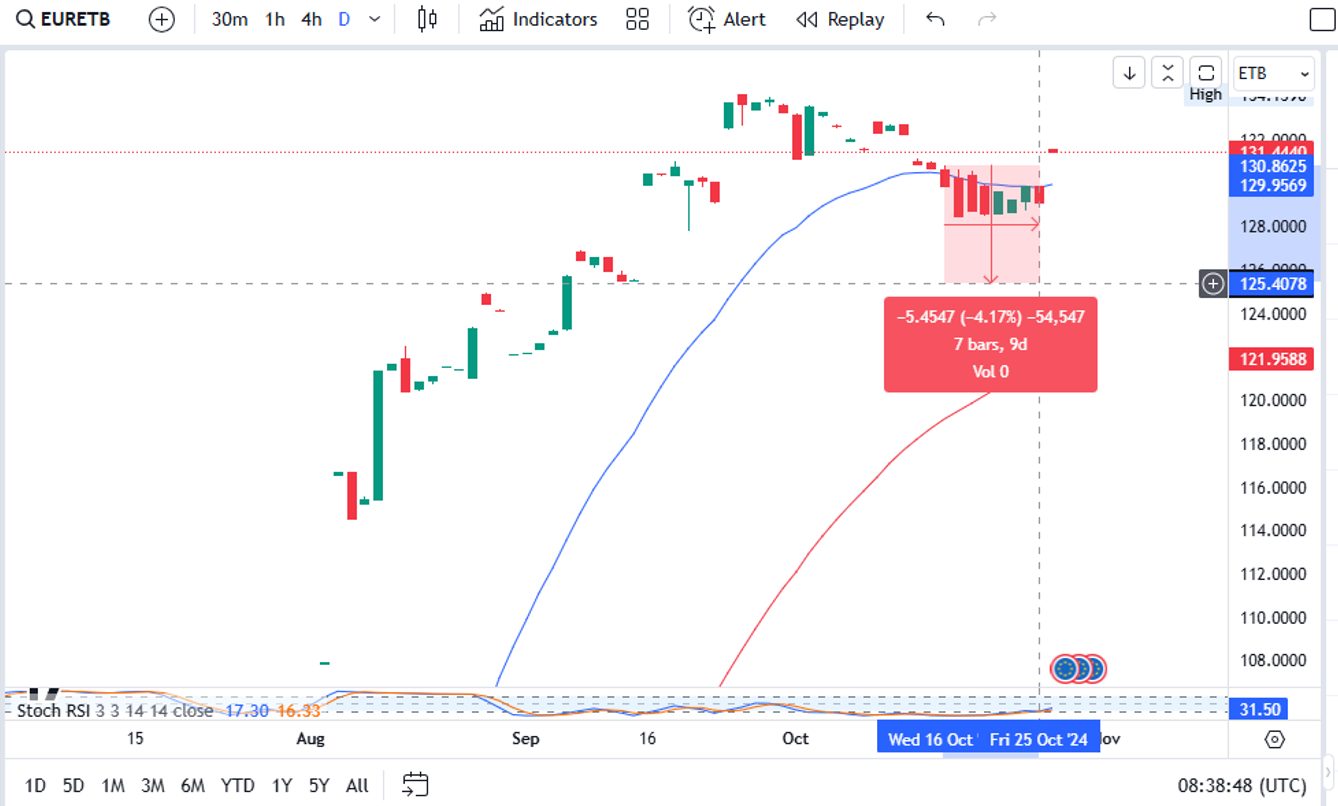Forex Trading In Ethiopia



Following its war-torn history, the Ethiopian economy is transitioning to a market economy, presenting challenges and opportunities for forex traders.
Political instability has led to fluctuations in Ethiopian birr (ETB) values and increased volatility in the forex market. At the same time, the country’s reliance on imports and foreign investment makes it susceptible to external economic shocks.
Despite these challenges, forex trading in Ethiopia is growing in popularity as the regulatory and tax landscape evolves to cater to the increasing demand in retail trading.
In this beginner’s guide, we unpack the essentials: how forex trading works, optimal trading times, Ethiopian regulations and taxes, plus an example of a EUR/ETB trade.
Quick Introduction
- The Ethiopian birr (ETB) could be traded in pairs like USD/ETB and EUR/ETB. However, practically, the birr lacks the trading volumes many short-term traders rely on for reliable execution and competitive fees.
- Forex trading in Ethiopia is legal but the regulatory environment, overseen by the National Bank of Ethiopia (NBE), is developing slowly, with residents typically turning to international trading platforms.
- The best time to day trade forex in Ethiopia (EAT, UTC+3) is generally between 4:00 PM and 8:00 PM. This overlaps the London and New York sessions when market liquidity and volatility are highest, creating more opportunities.
- Forex traders in Ethiopia may need to pay capital gains tax of 30% on any profits to the Ministry of Revenues, though consulting a tax professional is recommended.
Best Forex Brokers In Ethiopia
From our latest tests as of April 2025, these 4 platforms are the frontrunners for forex traders in Ethiopia:
How Does Forex Trading Work?
Forex trading, or FX trading, involves the conversion of one currency into another, with around $7.5 trillion worth of forex transactions every day according to the latest data from the Bank for International Settlements (BIS).
Traders aim to capitalize on short-term currency fluctuations by simultaneously buying one currency and selling another, hence you trade a pair of currencies.
For example, you could buy the Ethiopian birr (ETB) against the US dollar (USD/ETB) if you expect the birr to strengthen, and then sell it once it rises in value to capture the difference as profit, minus any fees, which are typically charged through ask-bid spreads.
The most popular currency pairs including birr are USD/ETB (US dollar/Ethiopian birr), EUR/ETB (euro/Ethiopian birr), and GBP/ETB (British pound/Ethiopian birr).
However, from our investigations, online platforms don’t usually support trading in the birr and low dealing volumes make executing trades at optimal times and prices challenging, potentially impacting the profitability of day trading strategies.
As a result, Ethiopians, like much of the world, may choose to focus on major currency pairs like EUR/USD (euro/US dollar), USD/JPY (US dollar/Japanese yen) and GBP/USD (British pound/US dollar).
Getting Started
Ethiopian forex traders can start doing business in three steps:
- Select a top forex broker for Ethiopian traders: If you’re a beginner, consider demo account support and educational tools. If you’re an experienced trader, look out for trading costs (spreads and commission), leverage availability, and the quality of the charting platform. Note that for amounts exceeding $4,000, the National Bank of Ethiopia requires a customs declaration.
- Set up a trading account: You’ll need to pass your chosen broker’s KYC (Know Your Client), verify your identity and proof of residence (usually your passport and driving licence), and meet anti-money laundering regulations. This can be cumbersome but you’re usually up and running within a few days in our experience.
- Deposit funds: You can deposit funds in your trading account via bank transfer, debit card or online payment provider depending on the broker you choose. Apple Pay and PayPal serve the Ethiopian market. Unfortunately, there aren’t many forex brokers with accounts based in Ethiopian birr so you may need to pay FX conversion fees when you deposit (and withdraw).
Is Forex Trading Legal In Ethiopia?
Forex trading in Ethiopia operates within an evolving legal framework set out by the National Bank of Ethiopia (NBE).
However, it trails the level of activity and oversight provided by many ‘green tier’ bodies in DayTrading.com’s Regulation & Trust Rating.
Citizens can also open trading accounts with offshore brokers regulated in foreign jurisdictions. However, the National Bank of Ethiopia has restricted the use of unauthorized forex brokers, and trading through unregulated providers could result in legal consequences, including the loss of your funds.
Is Forex Trading Taxed In Ethiopia?
Limited information about specific forex taxation in Ethiopia is available as the tax landscape evolves.
According to PwC, Ethiopia has a capital gains tax of 30%, which applies to shares and bonds, but it’s less clear if this applies to forex trading activities.
As a result, Ethiopian traders should consult with local professionals to ensure tax and legal compliance.
Tax returns are generally due by 7 December for individual taxpayers, aligning with the Ethiopian fiscal year, which runs from 8 July to 7 July.
When Is The Best Time To Trade Forex?
The windows below provide ideal conditions in terms of liquidity and volatility, giving forex traders in Ethiopia optimal entry and exit points. Ethiopia operates in EAT, UTC+3.
- London Session (11:00 AM – 7:00 PM). Key Pairs: EUR/USD, GBP/USD, EUR/GBP. Why: High liquidity as Europe’s market opens; ideal for trading European pairs.
- New York Session (4:00 PM – 12:00 AM). Key Pairs: USD/ETB, USD/JPY, EUR/USD. Why: Overlaps with London session, creating high volatility and significant price moves.
- London/New York Overlap (4:00 PM – 7:00 PM). Key Pairs: EUR/USD, GBP/USD, USD/CHF. Why: Peak trading time with the highest volume; great for fast-paced trades and price action.
- Asian Session (3:00 AM – 12:00 PM). Key Pairs: USD/JPY, AUD/USD, USD/CHF. Why: Lower liquidity but good for trading JPY pairs due to Japan’s market activity.
A Forex Trade In Action
To show you how forex trading in Ethiopia really works, below is a trade I executed with the EUR/ETB currency pair.
Analysis
As a technical trader, I use the momentum bounce strategy for forex trading on daily timeframes or lower.
With price action looking bearish and breaking through the 20-day moving average, I looked for further confirmation on lower timeframes before deciding to enter the trade using confirmed support and resistance levels for both my trade entry and exit points.

I executed the trade on the daily chart using confirmed and established support and resistance levels, setting a sell order at 130.200 and a take profit order at 138.500. The trade played out as planned, and I exited in profit.
Bottom Line
Before starting forex trading in Ethiopia, keep in mind the political instability, currency volatility, and a developing regulatory and tax landscape, and build a trading strategy you feel comfortable with.
Despite the risks, forex trading presents opportunities daily, offering Ethiopian traders a low-entry route to potentially create an online income stream. Still, never risk more than you can afford to lose.
To get moving, turn to DayTrading.com’s pick of the top brokers for trading forex in Ethiopia.
Recommended Reading
Article Sources
- National Bank of Ethiopia (NBE)
- Bank for International Settlements (BIS)
- Ministry of Revenues
- Personal Income Tax in Ethiopia - PwC
- Ethiopia - WorldBank
The writing and editorial team at DayTrading.com use credible sources to support their work. These include government agencies, white papers, research institutes, and engagement with industry professionals. Content is written free from bias and is fact-checked where appropriate. Learn more about why you can trust DayTrading.com



